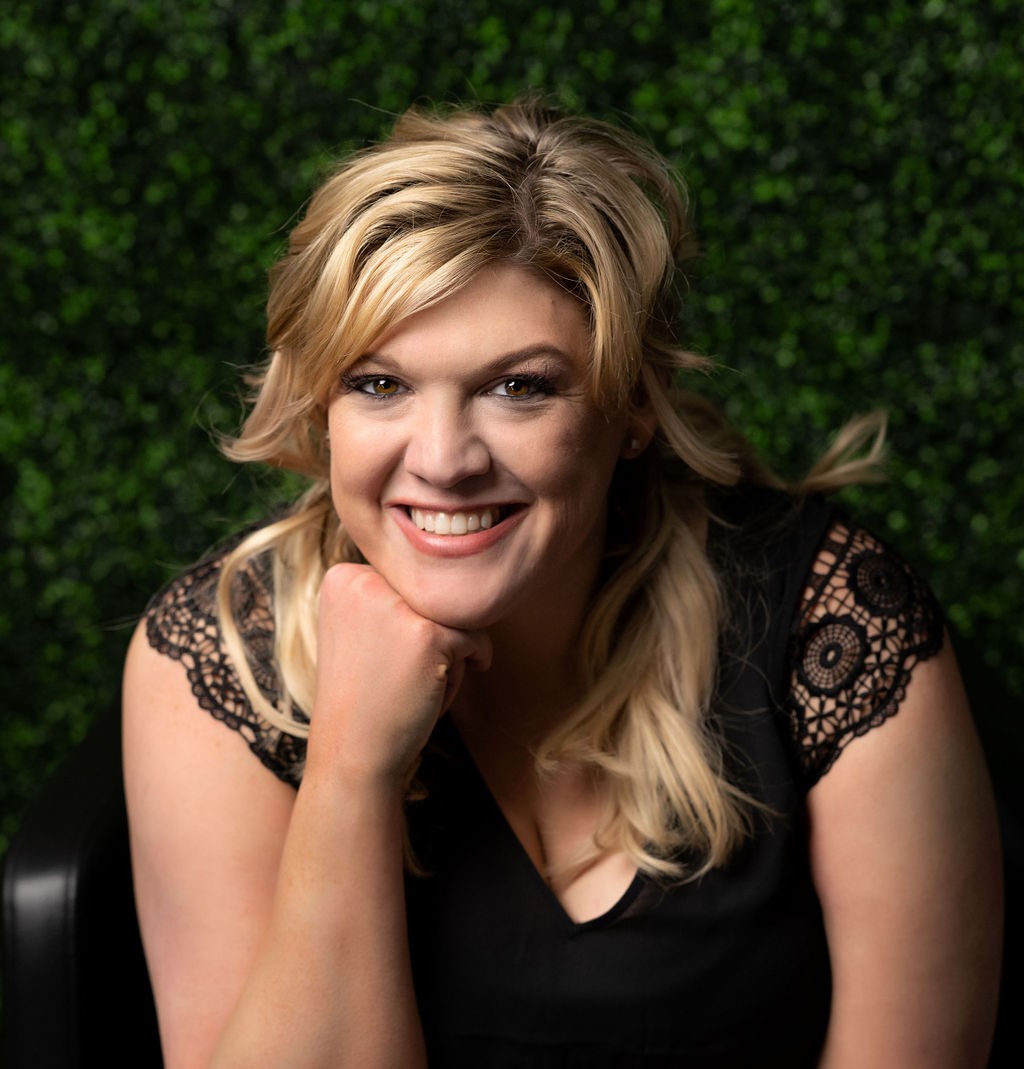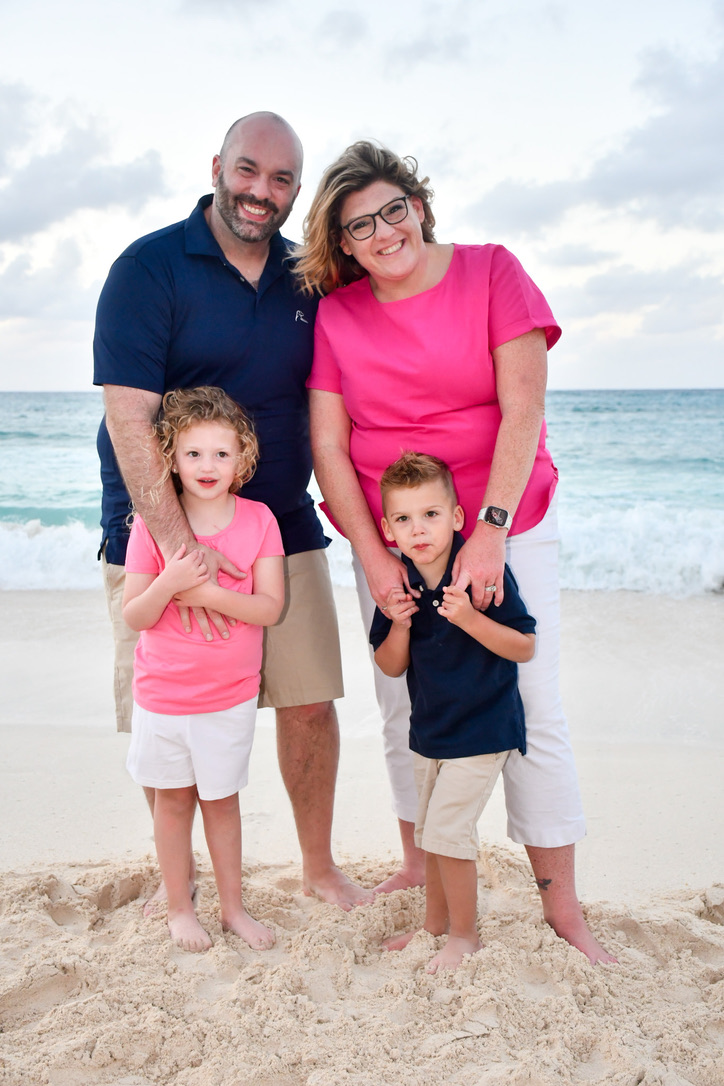Jennifer Hintzsche, M.S. '10, Ph.D. '14, Turns to Her NIU Education During Hardship
By Lia Kizilbash Gillet

Jennifer Hintzsche, M.S. ’10, Ph.D. ’14, is happiest when she solves complex problems that have a solution at the intersection of science and technology.
Hintzsche’s passion led her to various careers in science. As a post-doctoral fellow cancer research scientist and assistant research associate, Hintzsche and her colleagues made significant strides in cancer genomics, securing million-dollar grants and clinical trials. As an adjunct biology instructor at Waubonsee Community College, Sugar Grove, Illinois, and Kishwaukee College, Malta, Illinois, Hintzsche spent almost 12 years teaching the next generation of scientists and developed two online courses.
In high demand for her expertise analyzing and explaining data in a biological context, she started Next Level Bioinformatics, a data analytics company. Following the demand, she worked at multiple software-as-a-service (SaaS) companies in the health-tech sector. First as a technical business analyst, then as a manager of business intelligence, a product manager, and eventually a director of product management.
During her professional journey, Hintzsche experienced infertility. That’s when her pursuit to solve problems became personal.
“I was told I had ‘unexplained infertility,’ she said. “I immediately went into problem-solving mode. The word ‘unexplained’ literally meant the doctor didn’t know why I couldn’t get pregnant.”
Hintzsche was offered a costly infertility option that she couldn’t afford, and her insurance wouldn’t pay for any procedures due to “unexplained infertility.” She struggled to understand how she was medically offered a costly solution without doctors understanding the root of the problem.
“I dug into the scientific research and found a non-invasive solution with limited studies showing it had the same live birth rate as the clinical treatment I couldn’t afford,” Hintzsche said. “I made my own sterile intracervical insemination kit to replicate this and tried it myself at home. During the second month of use, we conceived our first daughter, Lois.”
Shortly after Lois was born, Hintzsche had a surprise pregnancy, which resulted in the birth of her son, Zack.
“After back-to-back births, the pandemic hit, and I was trying to climb the corporate ladder, but I was burnt out,” Hintzsche shared. “My husband came home one day, and I said, ‘What if we made “Lois-makers” available for everyone to try?’”
In December 2023, the same kit Hintzsche used to conceive Lois was FDA-cleared under the brand name PherDal, the company Hintzsche founded and where she now serves as CEO. PherDal has three patents for sterile at-home insemination. The kit’s key differentiator from other devices on the market is bypassing bacterial interference in the reproductive tract which has been linked to infertility. The kit (at the time of this article's publication) is sold at $199, roughly $10K less than what Hintzsche was told her in-office solution would cost.
Since the soft launch of the PherDal Kit, Hintzsche has heard from parents whose babies her device helped conceive.
“I never want to stop chasing the joy I feel from hearing from those parents,” Hintzsche remarked. “We are gearing up to be able to expand our supply chain and partnerships to make sure every person has an accessible at-home fertility option they can try.”
Hintzsche continued, “People think infertility is cured with a child. It’s not. I’m grateful every single day for the children I was told I wouldn’t have, but the infertility trauma didn’t go away because of them. I know this pain. I understand how it consumes you, breaks you down, and can wreck your relationship with yourself and your partner. Knowing I helped someone from experiencing at least some of that pain keeps me going. Having an inbox full of baby pictures is also pretty motivating.”
Hintzsche received her bachelor’s degree in biochemistry and molecular biology from Augustana College before coming to NIU, where she earned her master’s degree in bioinformatics and was the first student to earn a Ph.D. in bioinformatics from Northern. Her husband, Ryan Westphal, '08, is also a Huskie, along with her brother, Brian Hintzsche, M.A.S. '05, and his wife, Kelly (Morton) Hintzsche, J.D. '08.

Hintzche’s youth and college years were marked with challenges and lessons.
From an early age Hintzsche learned about hard work. Her father ran a successful family agricultural business with his brothers and cousins for 52 years, and her mother ran a local car dealership. Every day after school she would visit her grandmother’s hair salon.
“I would help her sweep the floor, rinse curlers, learn to take payments, and give change to customers,” Hintzsche recalled. “I saw how much she cared for and loved her customers, just like family.”
When she was seven years old, Hintzsche’s uncle and cousin died in a car accident.
“At a very early age I learned that life was precious and not promised,” she said. “I’m most grateful for the experiences that taught me hard lessons; they gave me perspective, motivation and purpose.”
Hintzsche first came to NIU to study cancer. After the loss of three grandparents to cancer, she wanted to study it, try to stop it, and at least understand it. Her father was also diagnosed with cancer while Hintzsche was at NIU.
But almost 75% of the way through her master’s degree, Hintzsche was told her lab project wasn’t working and she would need to find a new one; she was heartbroken. Her advisor, the late Dr. Thomas Sims, told her how gifted she was at computers and suggested that she join the new bioinformatics program with the late Dr. Mitrick Johns.
“Dr. Johns told me if I took the first and second semesters of C++ (a programming language), I could get into his lab,” Hintzsche said. “Six months later, I knocked on his door with my two A’s and declared, ‘I love coding!’ He said, ‘Welcome!’ and I finally found a spot that fit right at the intersection of biology and computer science. That set me on the path to becoming the first M.S. and Ph.D. in biology completed 100% computationally in the new field of bioinformatics.”
Hintzsche fondly recalls being a teaching assistant for the genetics laboratory—or as she called it, “JENN-etics”—under the leadership of Pat McCarthy.
“Students had to breed flies and map genetic chromosomes in order to identify traits found in the flies,” she explained. “I got to know so many other teaching assistants and students that I still am friends with today because of my time in the fly lab! Leading the lab, Pat McCarthy was always willing to help and encouraged us to do our best.”
Part of Hintzsche’s Ph.D. dissertation was on sequencing the petunia genome which was published in the academic journal, Nature. Ironically, Hintzsche pointed out that she now lives in Dixon, Illinois, the petunia capital of the world.
“I framed the article for myself upon graduating,” said Hintzsche. “It’s still in my office today and reminds me of what can happen when someone takes a chance on you.”
Dr. Sims and Dr. Johns were two of Hintzsche’s favorite professors. She said Sims saw something in her that others didn’t and encouraged her to try new things, and Johns taught her to think more critically, pushed her to defend her science and think bigger.
“Dr. Johns gave me the best compliment I’ve ever received,” Hintzsche said. “At my graduation, he said to me, ‘I wouldn’t ever bet against you.’”
